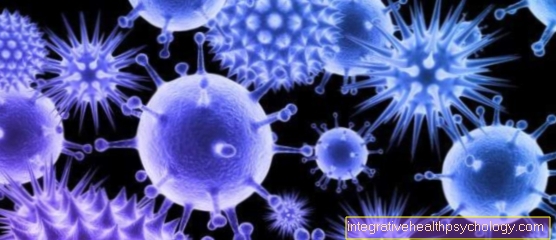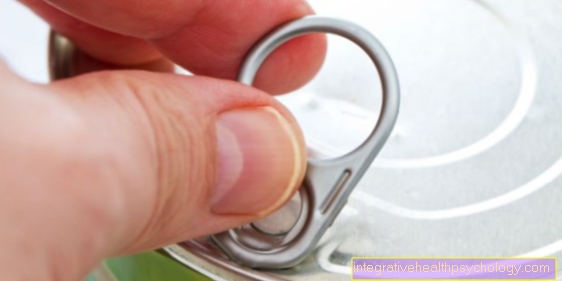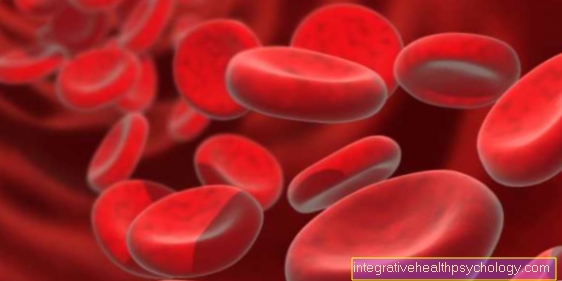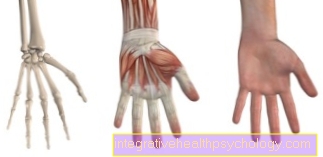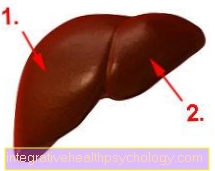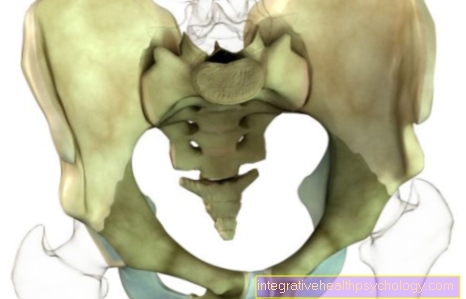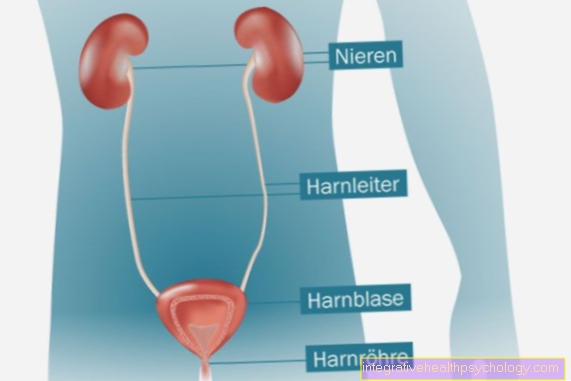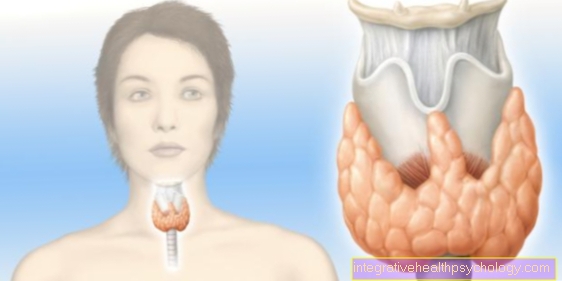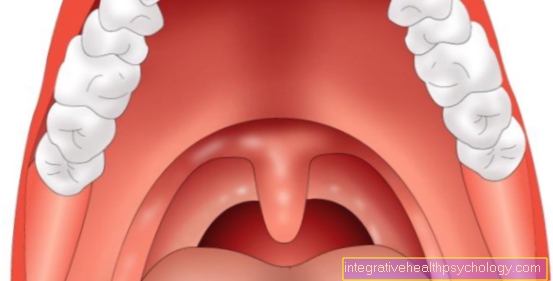Triamteren
definition
Triamterene is an organic chemical substance and is used in medicine to eliminate excess fluid from the body, for example in the case of edema.
This happens through increased urine excretion. Triamteren acts here at the end of the urine-forming system (distal tubule and collecting tube) and is therefore potassium-sparing.
Chemical name
2,4,7-triamino-6-phenyl-pyrazino [2,3-d] pyrimidine
application areas
The main application for triamteres is found in high blood pressure (Hypertension) and water retention in the legs (Leg edema)
effect
Triamterene blocks the aldosterone-dependent (Mineral corticoid from the adrenal cortex) sodium channel at the end of the urine-producing system (distal tubule and collecting tube).
Here normally under the action of the mineral corticoid aldosterone sodium (Na +) is reabsorbed into the cells.
As Na + is positively charged, a positively charged particle must be discharged from the cell in return. In this case it is potassium (K +). Sodium pulls the water behind it into the cells and then into the bloodstream.
If this sodium channel is blocked by triamterene, then less Na + is absorbed into the cells, thus less water is transported back into the bloodstream and less potassium is released into the urine. Thus, Triamteren is a potassium-sparing diuretic.
Triamteren can therefore work all the better, the more Na + arrives at the end of the urine-forming system. Therefore, there are triamteres often in connection with other classes of substances that intervene further in the urinary system and increase the Na + concentration in the urine (e.g. hydrochlorothiazide, bemeticide, propranolol-HCl).
Contraindications
There are some contraindications for Triamteren alone, in which the use of Triamteren should be avoided.
When too high a blood level of potassium (Hyperkalemia) or low blood sodium levels (Hyponatremia) triamterene may not be used.
Furthermore, the use of Triamteren is not allowed if the kidney function is severely restricted. This is the case when the kidneys produce less than 30 ml / min urine and / or Creatinine levels is higher than 1.8 mg / 100 ml in the blood. In this case, Triamteren is ineffective.
Further contraindications result from the combination with other active ingredients.
Application restriction

If the following factors are present, the indication for the use of triamterene should be made very strictly.
If the kidney only produces 30-60ml / min urine or the Creatinine level is between 1.8-1.5ml / 100ml in the blood, then the potassium concentration in the blood should be monitored, as this can lead to increased potassium levels more easily.
Also the Intervals between the individual doses of the drug should be checked, as the half-life (the time until half of the drug has been broken down in the blood) of the drug in the blood can increase.
Heightened caution is also with Kidney stones required.
There is also an increased need for control Diabetes mellitus (Diabetes) and if suspected Folic acid deficiency for example in liver damage, alcohol abuse and pregnancy with malnutrition.
More on this topic at: Medication during pregnancy
In the pregnancy and Lactation a strict indication must also be given. There is insufficient experience as to whether the drug and in what way it may harm the unborn child. No damage to the unborn child was found in animal experiments. However, influencing the Growth to be watched. Triamteren passes into breast milk.
Further restrictions on use result from the combination with other active ingredients.
Side effects
Various side effects can occur with treatment with triamterene.
A Rash form, as in a hypersensitivity reaction and to fever to lead. It can too Muscle tension, a headache, nervousness, dizziness and fatigue come. It can cause palpitations in the heart and affect blood pressure regulation to such an extent that getting up from a sitting or lying position makes you dizzy (orthostatic regulation disorders).
Furthermore, it can be too Dry mouth, nausea and Vomit come and to Diarrhea.
Raised levels of potassium in the blood may occur (Hyperkalemia) cause and a shift in blood pH in the acidic Area.
Occasionally there can also be changes in the blood count. Waste of white blood cells (Leukopenia) and the Platelets (Thrombopenia).
With additional folic acid deficiency it comes to Anemia with red blood cells that are too large (megaloblastic anemia).
On the kidney itself, triamterene can lead to increased formation of Urinary stones lead to an increase in urea and creatinine in the blood, especially at the start of treatment.
Depending on the combination with additional active ingredients, it can lead to further side effects.
Interactions
With combinations of triamterene and certain classes of other drugs, the effect can either be weakened or increased, or the side effects are increased.
Triamteren together with others antihypertensive Medication or alcohol given, the antihypertensive effect is increased.
Particular care should be taken with the drug group ACE inhibitors required.In these cases, in addition to the increased reduction in blood pressure, there is also an increased potassium level in the blood, since both drugs, i.e. triamterene and ACE inhibitors, are potassium-sparing. The potassium level can also rise if you take additional potassium or use other drugs that are also potassium-sparing.
When indomethacin (a drug used to treat rheumatic pain) is given, the ability of the kidneys to excrete is restricted. In combination with Triamteren there is also an increased here Potassium levels in blood.
In diabetics it can happen that the effects of the drugs against diabetes (Anti-diabetic drugs) that can be taken in tablet form is weakened.
Particular caution is required when taking triamterene and lithium at the same time, as there is increased damage to the Heart and the nerves can come (cardio and neurotoxic effects of lithium).
Note
At the beginning of the treatment or when changing the preparation, a regular check by the doctor should be carried out, since individually occurring different reactions can lead to restrictions in traffic or in the operation of heavy machinery.



